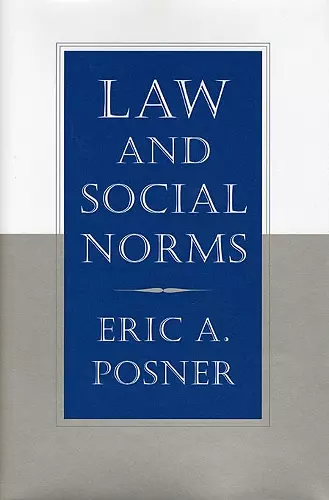Law and Social Norms
Format:Paperback
Publisher:Harvard University Press
Published:7th Apr '02
Currently unavailable, and unfortunately no date known when it will be back

Eric Posner has written a bold and provocative thesis about one of the most important and fastest developing areas of legal scholarship. He has a powerful structure that states his thesis elegantly, acknowledges alternative views, applies his theories to a host of legal fields, and collects normative legal implications. Law and Social Norms should become one of the standard references to norm theory. -- Ian Ayers, Yale Law School Eric Posner discusses the leading issues on the agenda for research on law and social norms, providing detail and references that many scholars will value...Law and Social Norms aims at insights into a broad array of moral behavior based upon an economic vision of man, and it is a valuable source for hypotheses and insights about many normative facts and institutions. -- Robert Cooter, University of California, Berkeley With its innovative use of signaling models, Law and Social Norms makes a significant contribution to economic and legal theory. Using a parsimonious account of human behavior, Eric Posner pushes the domain of economics to include subjects recently considered only by sociologists, anthropologists, and psychologists. At a time when economics is struggling over how best to explain group solidarity, conformity, and social norms, this book promises to be influential in determining the path economic theorists take. -- Richard H. McAdams, University of Illinois College of Law
Eric Posner argues that social norms are sometimes desirable yet sometimes odious, and that the law is critical to enhancing good social norms and undermining bad ones. He argues that current understanding of social norms is inadequate for guiding judges and lawmakers, and offers a model of the relationship between law and social norms.
What is the role of law in a society in which order is maintained mostly through social norms, trust, and nonlegal sanctions? Eric Posner argues that social norms are sometimes desirable yet sometimes odious, and that the law is critical to enhancing good social norms and undermining bad ones. But he also argues that the proper regulation of social norms is a delicate and complex task, and that current understanding of social norms is inadequate for guiding judges and lawmakers. What is needed, and what this book offers, is a model of the relationship between law and social norms. The model shows that people's concern with establishing cooperative relationships leads them to engage in certain kinds of imitative behavior. The resulting behavioral patterns are called social norms.
Posner applies the model to several areas of law that involve the regulation of social norms, including laws governing gift-giving and nonprofit organizations; family law; criminal law; laws governing speech, voting, and discrimination; and contract law. Among the engaging questions posed are: Would the legalization of gay marriage harm traditional married couples? Is it beneficial to shame criminals? Why should the law reward those who make charitable contributions? Would people vote more if non-voters were penalized? The author approaches these questions using the tools of game theory, but his arguments are simply stated and make no technical demands on the reader.
Eric Posner wishes to improve the economic analysis of law by incorporating into it a more rigorous understanding of the impact on behavior of the social meaning of action. In his lucidly written and sharply argued book on the relation between law and 'non-legal mechanisms of cooperation,' Posner contends that many conceptual confusions and embarrassing puzzles that have been generated by the economic analysis of law can be cleared up, and the research paradigm as a whole can be advanced, by taking account of the pervasive and powerful role of social norms." -- Peter Berkowitz * New Republic *
Posner, in seeking to establish the central importance of what he calls 'social norms,' gives the example of Christmas fruit cake: People bake fruit cakes, exchange them and sometimes try to eat them. No law requires this. And few enjoy it (as Posner stipulates). Yet people still manufacture them; such, Posner concludes, is the power of social norms which function as signals that players have won an advantage in the competitive 'game' of life...[Posner's] book concludes that social norms have evolved as arbitrarily as peacock's tails have, and with much the same purpose--to signal their holders' desirability as partners for strategic cooperation. Failure to conform to social norms reveals unreliability, even though--or, more precisely, because--such norms are fundamentally arbitrary and costly to maintain." -- M.N.S. Sellers * Washington Post *
Eric Posner has written a bold and provocative thesis about one of the most important and fastest developing areas of legal scholarship. He has a powerful structure that states his thesis elegantly, acknowledges alternative views, applies his theories to a host of legal fields, and collects normative legal implications. Law and Social Norms should become one of the standard references to norm theory. -- Ian Ayers, Yale Law School
Eric Posner discusses the leading issues on the agenda for research on law and social norms, providing detail and references that many scholars will value...Law and Social Norms aims at insights into a broad array of moral behavior based upon an economic vision of man, and it is a valuable source for hypotheses and insights about many normative facts and institutions. -- Robert Cooter, University of California, Berkeley
With its innovative use of signaling models, Law and Social Norms makes a significant contribution to economic and legal theory. Using a parsimonious account of human behavior, Eric Posner pushes the domain of economics to include subjects recently considered only by sociologists, anthropologists, and psychologists. At a time when economics is struggling over how best to explain group solidarity, conformity, and social norms, this book promises to be influential in determining the path economic theorists take. -- Richard H. McAdams, University of Illinois College of Law
ISBN: 9780674008144
Dimensions: 241mm x 156mm x 19mm
Weight: 390g
272 pages